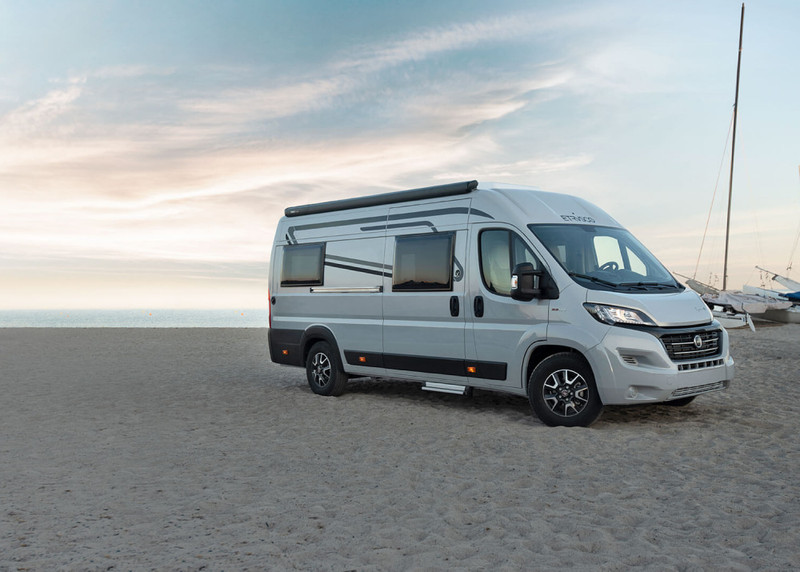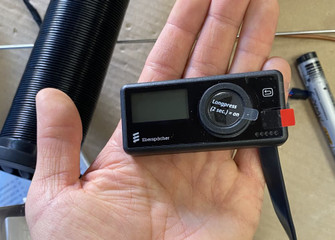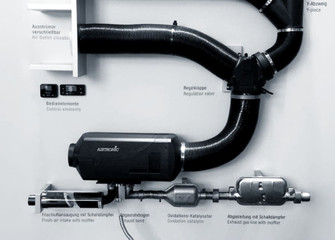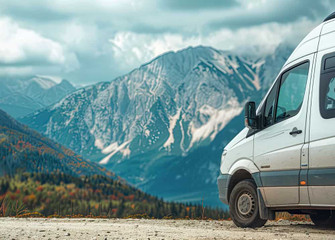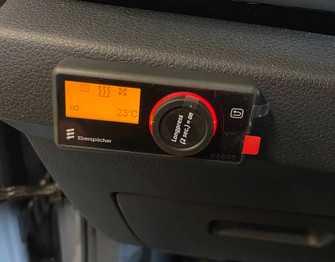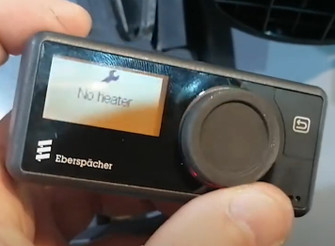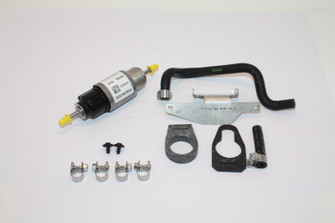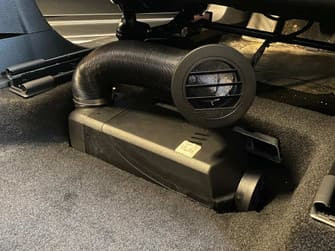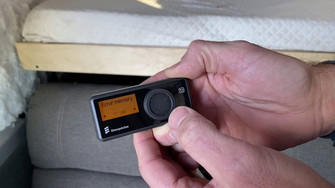How to get WiFi in a camper van or RV?
Posted by Heatso on 6th Apr 2022
In our day and age, having access to the internet is essential. With WiFi, you can stay connected to your friends and relatives anywhere you go, work remotely, and enjoy the benefits of technology just as you would at home.
HOW TO GET WIFI IN
A CAMPER VAN OR RV?
WHY DO YOU NEED
WIFI IN YOUR MOTORHOME?
In our day and age, having access to the internet is essential. With WiFi, you can stay connected to your friends and relatives anywhere you go, work remotely, and enjoy the benefits of technology just as you would at home. It lets you use social media, stay up to date, shop online, and so much more.
In this blog, we’ll be showing how to get WiFi in a camper anywhere you go. We’ll explain the main components that you need to install for van life WiFi and discuss the different options available.
WHY DO YOU NEED
WIFI IN YOUR MOTORHOME?
In our day and age, having access to the internet is essential. With WiFi, you can stay connected to your friends and relatives anywhere you go, work remotely, and enjoy the benefits of technology just as you would at home. It lets you use social media, stay up to date, shop online, and so much more.
In this blog, we’ll be showing how to get WiFi in a camper anywhere you go. We’ll explain the main components that you need to install for van life WiFi and discuss the different options available.
WHAT'S THE DIFFERENCE
BERWEEN INTERNET, WIFI, 4G & BROADBAND?
We’ll be using these terms throughout the article, so here’s a quick refresher.
The internet is what you access through Google (or any other search engine), the sites you visit, the data you read and the images you view.
WiFi is a wireless signal that your device (laptop, phone, etc.) uses to connect to the internet. WiFi is distributed via a router, without the need for a physical wired connection to your device. This is also sometimes called wireless internet access.
4G (also LTE, 3G and 5G) are signals which float around in the air, generated from a cell tower. Your mobile device picks up the cell phone signal and uses it to access the internet. This is also sometimes called mobile internet or mobile broadband.
Broadband is a type of internet connection given by your internet service provider. It is the cable running to your router. WiFi is one of the means of connecting to broadband to access the internet.
CAN YOU GET
WIFI IN A CAMPERVAN?
There are multiple ways of getting WiFi while you’re on the road. Before the pandemic, many travellers would fulfil their internet needs in places with free public WiFi, like coffee shops, bars, and lounges. This is a great option if you’re planning to travel in mostly urban areas, but if your adventures are more rural, this will leave you with very limited access to the internet.
Nowadays, in the post-pandemic world, a lot of van dwellers switched to personal vanlife internet. Having WiFi that’s tied to your motorhome gives you greater flexibility, and allows you to work remotely and access the internet on the road. The 2 most popular WiFi options in your van are:
1. Using a smartphone, tablet or other mobile devices as a van hotspot.
2. Through a router like the Teltonika RUT950, with or without an external antenna.
CAN YOU GET
WIFI IN A CAMPERVAN?
There are multiple ways of getting WiFi while you’re on the road. Before the pandemic, many travellers would fulfil their internet needs in places with free public WiFi, like coffee shops, bars, and lounges. This is a great option if you’re planning to travel in mostly urban areas, but if your adventures are more rural, this will leave you with very limited access to the internet.
Nowadays, in the post-pandemic world, a lot of van dwellers switched to personal vanlife internet. Having WiFi that’s tied to your motorhome gives you greater flexibility, and allows you to work remotely and access the internet on the road. The 2 most popular WiFi options in your van are:
1. Using a smartphone, tablet or other mobile devices as a van hotspot.
2. Through a router like the Teltonika RUT950, with or without an external antenna.
USING YOUR SMARTPHONE
AS A VAN HOTSPOT
Built into nearly every modern smartphone is the ability to use the phone as a personal hotspot device. This means that if you have a smartphone or a tablet with a SIM, you can share the incoming 4G/5G signal with other devices. With one phone hotspot, you can provide an internet connection to your laptop, tablet, and smart TV, among other devices.
This is the simplest way to get internet for campers, with no additional equipment required. If you have a good signal, you can watch videos, browse the internet and have a WiFi connection hassle-free.
Nonetheless, there are a few downsides to this approach. First of all, you can only create a mobile hotspot if your phone is connected via 4G/5G. Your phone will not be able to share a WiFi connection if it’s connected to WiFi itself. Secondly, don’t expect a fast connection if you’re down to one or two bars. This method is highly dependent on your phone having a good signal, so it may not be for you if you need a reliable internet connection.
Another thing to keep in mind is the provider. Some mobile network providers limit the amount of data you can use when using a personal WiFi hotspot. Make sure you know your data cap or get an unlimited plan. If you’re going abroad, think ahead and find out your roaming fees, or use an international provider.
MOTORHOME WIFI USING
A CELLULAR ROUTER
Built into nearly every modern smartphone is the ability to use the phone as a personal hotspot device. This means that if you have a smartphone or a tablet with a SIM, you can share the incoming 4G/5G signal with other devices. With one phone hotspot, you can provide an internet connection to your laptop, tablet, and smart TV, among other devices.
This is the simplest way to get internet for campers, with no additional equipment required. If you have a good signal, you can watch videos, browse the internet and have a WiFi connection hassle-free.
Nonetheless, there are a few downsides to this approach. First of all, you can only create a mobile hotspot if your phone is connected via 4G/5G. Your phone will not be able to share a WiFi connection if it’s connected to WiFi itself. Secondly, don’t expect a fast connection if you’re down to one or two bars. This method is highly dependent on your phone having a good signal, so it may not be for you if you need a reliable internet connection.
Another thing to keep in mind is the provider. Some mobile network providers limit the amount of data you can use when using a personal WiFi hotspot. Make sure you know your data cap or get an unlimited plan. If you’re going abroad, think ahead and find out your roaming fees, or use an international provider.
MOTORHOME WIFI USING
A CELLULAR ROUTER
Cellular routers are transportable devices that enable users to connect to the Internet through the cellular gateway. A router works just like a mobile hotspot, only better, and with significantly more functionality. If you need permanent, reliable access to the Internet, a cellular router is probably the best solution.
Unlike a standard router that accesses the Internet via cable, a cellular router enables you to access the Internet through a cellular data network like 4G or 5G. The biggest advantage of the latter is the ability to stay connected while on the move.
The benefits of routers over mobile hotspots become evident pretty quickly. A cellular router such as the Teltonika RUT950 has multiple fallback mechanisms that allow you to reliably get the fastest connection available.
The Teltonika RUT240 is a tiny, cost-effective, and powerful 4G LTE router, perfect for vanlife and marine adventures. Combine it with the QuSpot outdoor LTE antenna and you have a solution that can catch a signal even in the most remote of places. The Teltonika router integrates snuggly into the QuSpot, making it ideal for yachts, boats, campers, RV, and more.
Although there is some setup required, it’s as easy as inserting a SIM card and connecting the power supply. Overall, a cellular router provides you with all the features and amenities you can expect from a home. This is the best option if your activities heavily rely on having an Internet connection, such as social media outreach, freelance or remote work, gaming, or watching Netflix without buffering.
CAMPERVAN WIFI ANTENNAS
Finally, we have the antenna. Also known as signal boosters, antennas can pick up even weak signals from a mile away, and amplify your network connection to reach greater speeds. Also, as your van is essentially a metal cage, it’s great at keeping electromagnetic waves out, which is a problem if you’re trying to catch them. An external antenna circumvents this problem of vanlife WiFi.
Although routers are pretty good at catching a signal and offer a more reliable connection than a mobile hotspot, it’s still going to struggle if you’re in the middle of nowhere. An external antenna can pick up either 4G or WiFi signals from far away, and amplify them. In turn, your router picks that signal up and now you have a strong and reliable internet connection in the middle of the desert.
Mounting an antenna will take some drilling, but it’s just a matter of one or two cables and drilling a hole in the roof. Make sure you install the antenna externally, as we mentioned previously, the metal box you’re driving prevents the signal we want to catch from getting inside.
CAMPERVAN WIFI ANTENNAS
Finally, we have the antenna. Also known as signal boosters, antennas can pick up even weak signals from a mile away, and amplify your network connection to reach greater speeds. Also, as your van is essentially a metal cage, it’s great at keeping electromagnetic waves out, which is a problem if you’re trying to catch them. An external antenna circumvents this problem of vanlife WiFi.
Although routers are pretty good at catching a signal and offer a more reliable connection than a mobile hotspot, it’s still going to struggle if you’re in the middle of nowhere. An external antenna can pick up either 4G or WiFi signals from far away, and amplify them. In turn, your router picks that signal up and now you have a strong and reliable internet connection in the middle of the desert.
Mounting an antenna will take some drilling, but it’s just a matter of one or two cables and drilling a hole in the roof. Make sure you install the antenna externally, as we mentioned previously, the metal box you’re driving prevents the signal we want to catch from getting inside.
CAMPERVAN WIFI ANTENNAS
Finally, we have the antenna. Also known as signal boosters, antennas can pick up even weak signals from a mile away, and amplify your network connection to reach greater speeds. Also, as your van is essentially a metal cage, it’s great at keeping electromagnetic waves out, which is a problem if you’re trying to catch them. An external antenna circumvents this problem of vanlife WiFi.
Although routers are pretty good at catching a signal and offer a more reliable connection than a mobile hotspot, it’s still going to struggle if you’re in the middle of nowhere. An external antenna can pick up either 4G or WiFi signals from far away, and amplify them. In turn, your router picks that signal up and now you have a strong and reliable internet connection in the middle of the desert.
Mounting an antenna will take some drilling, but it’s just a matter of one or two cables and drilling a hole in the roof. Make sure you install the antenna externally, as we mentioned previously, the metal box you’re driving prevents the signal we want to catch from getting inside.
WHICH VAN LIFE WIFI METHOD SUITS YOU BEST?
In summary, the WiFi solution that suits you best is based on just a few things. Choose between a mobile hotspot or router, antenna or no antenna, depending on where and for how long you’ll be travelling, how much you’ll be using the Internet, and how many devices you have. If you like watching movies, using your computer for work, or like to play video games online, go with a router. After all, in our day and age, a good internet connection can greatly improve your productivity and quality of life.
WHICH VAN LIFE WIFI METHOD SUITS YOU BEST?
In summary, the WiFi solution that suits you best is based on just a few things. Choose between a mobile hotspot or router, antenna or no antenna, depending on where and for how long you’ll be travelling, how much you’ll be using the Internet, and how many devices you have. If you like watching movies, using your computer for work, or like to play video games online, go with a router. After all, in our day and age, a good internet connection can greatly improve your productivity and quality of life.
